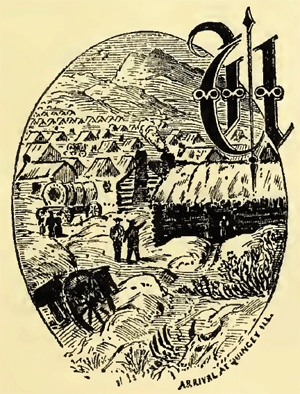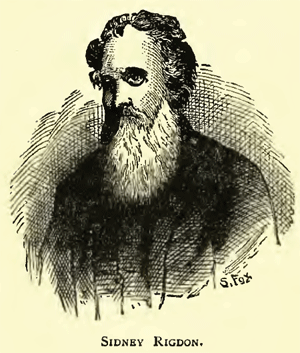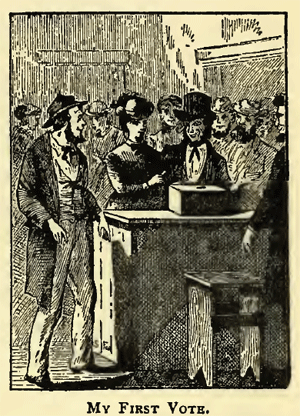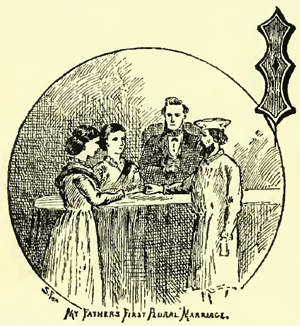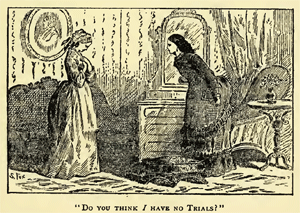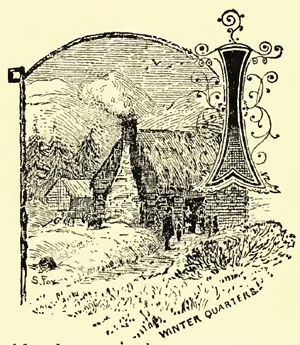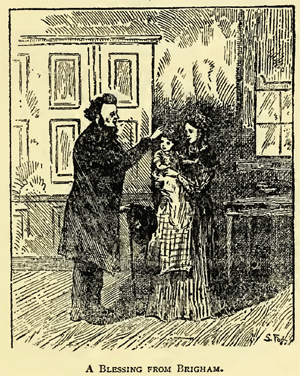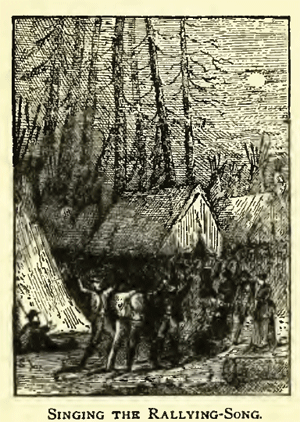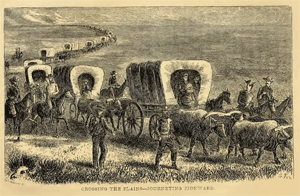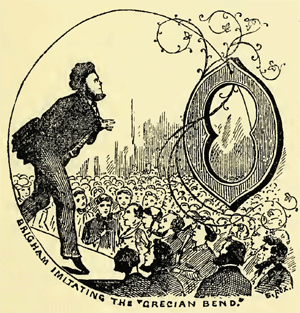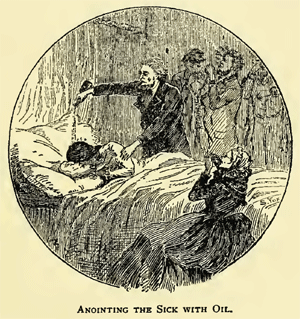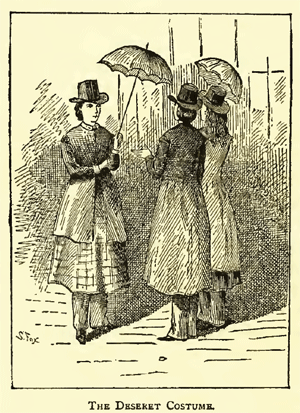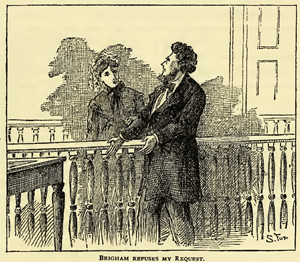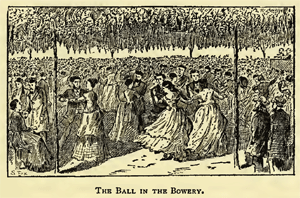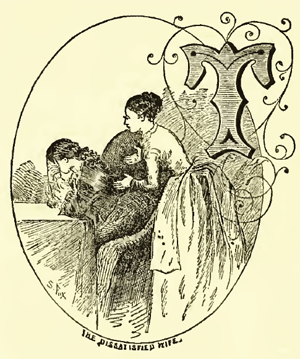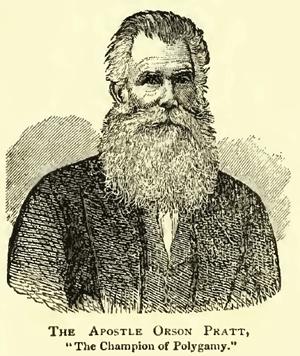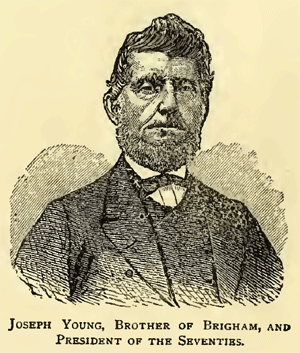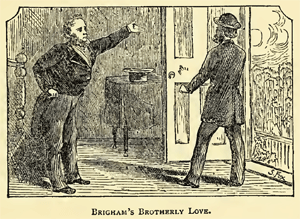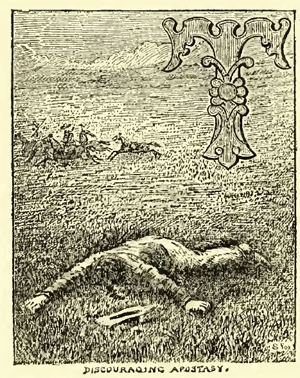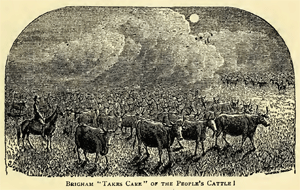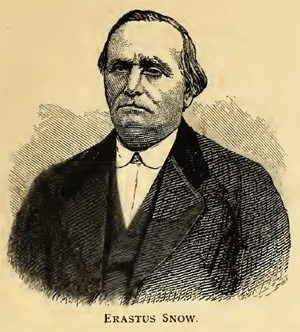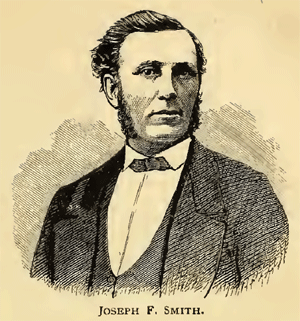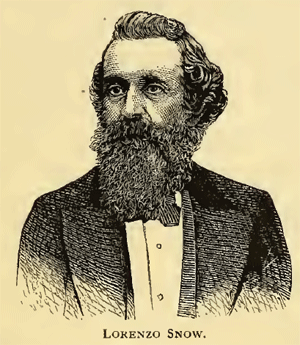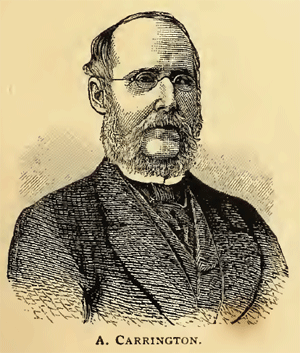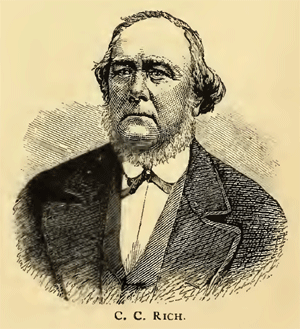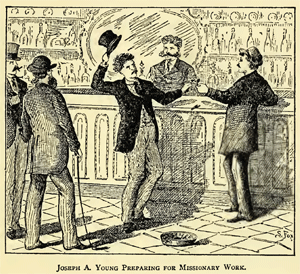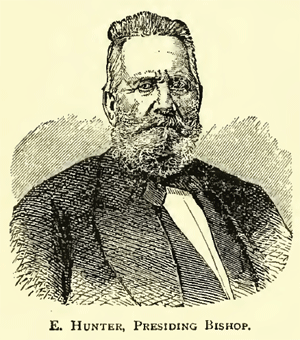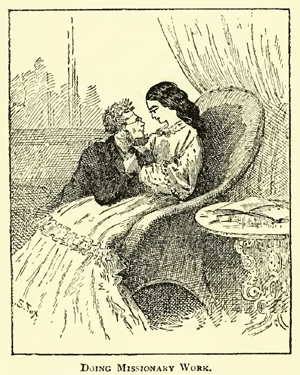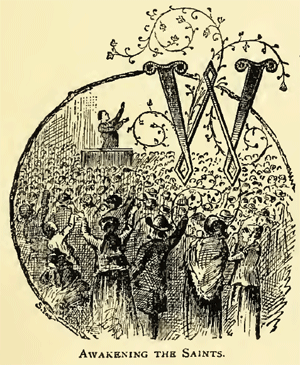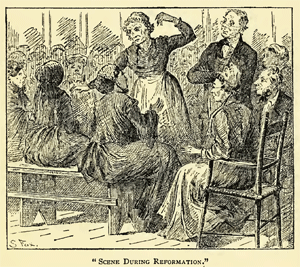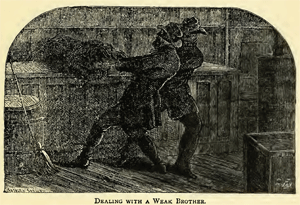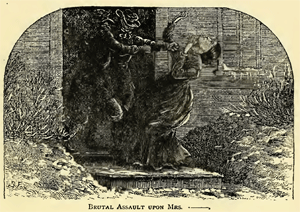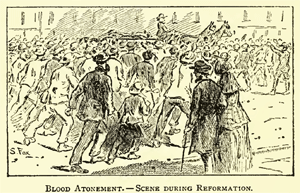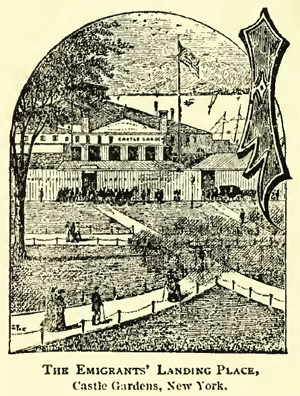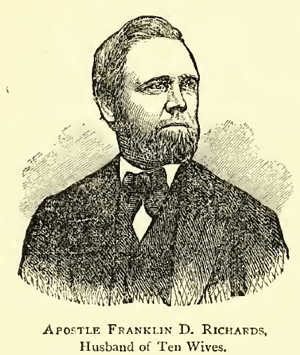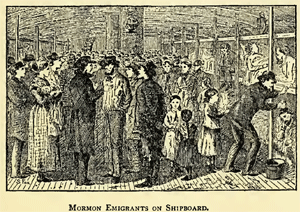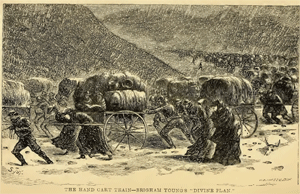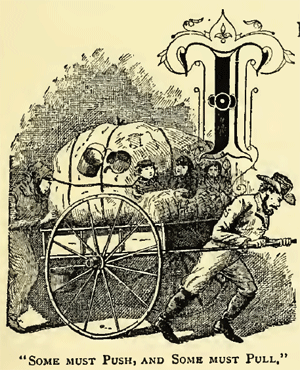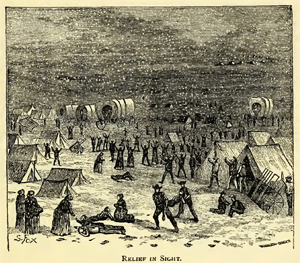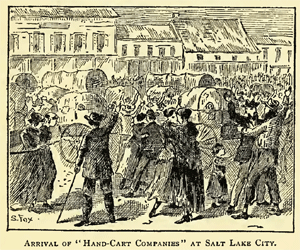The Announcement of Polygamy. "Celestial Marriage." Joseph "sets himself Right." Mrs. Smith is very Rebellious. Mrs. Smith's Adopted Daughter. The Prophet too fond of Fanny. Mrs. Smith takes her in Hand. Marital Storms. Oliver Cowdery called In. He goes and " Does Likewise." Joseph first Preaches Polygamy. The Saints Rebel. The Revelation given in Secret. Eleven "Adopted Daughters" sealed to the Prophet. A Domestic Squall in the Prophet's House. Nancy Rigdon Insulted by Joseph. Sidney's Zeal Grows Cold. How Celestial Marriage was Introduced. Mr. Noble begins to Build Up his Kingdom. The first Plural Marriage. False Position of the Second Wife. John C. Bennett. His Profligacy and Crimes. He Apostatizes and Writes a Book. Joseph Defends Himself. Apostasy of an Apostle's Wife. The Prophet in Difficulties. The Revelation on "Celestial Marriage."
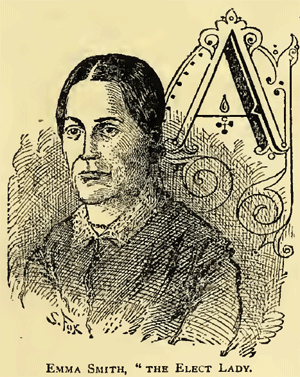
EMMA SMITH, "THE ELECT LADY"
AFTER the Revelation on Celestial Marriage was publicly announced, in 1852, it was stated that Joseph Smith first produced it in 1843; but there were, no doubt, hints of this new doctrine at a much earlier date. It is generally believed, and in fact well known by many of the old Nauvoo Mormons, that he had it in contemplation at a much earlier date; certain indiscretions rendering it necessary that he should find an excuse of some kind for acts that were scarcely consistent with his position as "Vicegerent upon earth," and set himself right, not only with his followers, but with Mrs. Emma Smith, his wife, who objected very decidedly to some of his prophetic eccentricities.
Mrs. Smith had an adopted daughter, a very pretty, pleasing young girl, about seventeen years old. She was extremely fond of her; no own mother could be more devoted, and their affection for each other was a constant object of remark, so absorbing and genuine did it seem. Consequently it was with a shocked surprise that the people heard that sister Emma had turned Fanny out of the house in the night.
This sudden movement was incomprehensible, since Emma was known to be a just woman, not given to freaks or caprices, and it was felt that she certainly must have had some very good reason for her action. By degrees it became whispered about that Joseph's love for his adopted daughter was by no means a paternal affection, and his wife, discovering the fact, at once took measures to place the girl beyond his reach. Angered at finding the two persons whom most she loved playing such a treacherous part towards her, she by no means spared her reproaches, and, finally, the storm became so furious, that Joseph was obliged to send, at midnight, for Oliver Cowdery, his scribe, to come and endeavor to settle matters between them. For once he was at his wits' end; he could face an angry mob, but a wronged woman made a coward of him at once.
The scribe was a worthy servant of his master. He was at that time residing with a certain young woman, and at the same time he had a wife living. He had taken kindly to Joseph's teachings, although he by no means coveted publicity in the affair; and after seeing Mrs. Smith's indignation he dreaded exceedingly lest Mrs. Cowdery should discover that he was practising his new religious duties with another woman.
The worthy couple the Prophet and his scribe were sorely perplexed what to do with the girl, since Emma refused decidedly to allow her to remain in her house; but after some consultation, my mother offered to take her until she could be sent to her relatives. Although her parents were living, they considered it the highest honor to have their daughter adopted into the Prophet's family, and her mother has always claimed that she was sealed to Joseph at that time.
The first public announcement Joseph ever made of his belief in the plurality of wives was at Nauvoo, in 1840. In a sermon one Sunday he declared that it was perfectly right in the sight of the Lord for a man to have as many wives as he pleased, if he could evade the laws of the land. Said he:
"People of polygamous nations will be converted to the church, and will desire to, gather with the Saints to Zion; and what will they do with their wives? We must have polygamy among us as an established institution, and then they can bring all their wives, with, them."
He referred to the Bible to sustain his position, and grew very eloquent on the subject. He seemed determined not only to maintain the doctrine to his own satisfaction, but to convince his people of its truth and its desirability.
As may readily be imagined, it caused the greatest excitement and indignation in the church; and many threatened to abandon the faith. The women most especially were aroused, and they declared they never would accept a doctrine so hateful. It was the first open rebellion against any of the Prophet's teachings by his most devoted followers, and he was wise enough to see his mistake, and to rectify it. Evidently, as he said to certain followers, it was "too soon for the Lord to reveal Himself upon this subject."
The following Sabbath he arose and said he wished to retract what he had said the Sabbath before; he was at that time only trying the Saints, to see what they could bear.
The Revelation at first was made known only to a few of Joseph's most intimate friends, and they were solemnly bound to keep its existence a secret; but in some way it became known very generally that there was such a Revelation, although it was not given to the world until 1852. It is on this ground that Smith's sons endeavor to palm the Revelation on to Brigham, and deny that their father ever intended to have polygamy become a church institution. The elder Mormons, who were at Nauvoo, among whom are my parents, know better than this, however, and also know the exact time when the "Revelation" was first talked of. If Smith was not a polygamist, his sons must allow that he was a libertine, or an advocate of free-love principles. It makes little difference which; the results are the same.
The wife of the Prophet took no more kindly to this new doctrine of Celestial Marriage than did the rest of the Mormon women, and no woman of them all allowed her objections to become so widely known as Mrs. Smith. She new her husband's nature too well to believe in the Divine origin of the system, and she fought it persistently during his lifetime.
At one time he had eleven young ladies living in his family as adopted daughters, to whom he had been sealed without the knowledge of his wife. She for some time supposed that his object in having them there was purely a charitable one. To be sure, some of them had parents living; yet there was some plausible reason always given for having them under his roof, which none of the Saints dared to question, although many of them, especially those who were growing disaffected, were dissatisfied with his reasons, and suspicious of his motives. Very little was said about it openly, until his wife saw something which aroused her suspicions, and she remonstrated with Joseph for having the girls there; but with no effect. The girls should remain -- on that point he was decided.
Unlike many of the Mormon women, Mrs. Smith was not one to accept a cross of this kind submissively. She by no means bowed her head, broke her heart, and silenced her lips, and allowed her husband to pursue his licentious course without opposition. When Joseph would not send away the girls, she said very quietly, but with a determination which showed she was making no idle threat, --
"Either those girls leave this house to-night, or I do."
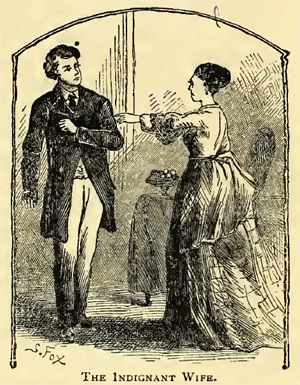
THE INDIGNANT WIFE.
"Very well," replied her husband, in a passion at having his authority questioned; "you may go, then, for I intend them to stay."
Without another word she left the house. No sooner had she gone than he began to consider the consequences of her departure directly it should be known, and she would keep neither it nor the cause which provoked her to the step a secret. The publicity of the affair was more than he dared meet. He was not yet ready to encounter the storm it would raise. Great as was his influence over his people, he did not dare risk his popularity by such a bold movement as this. Consequently he followed his wife, and prevailed upon her to return, by promising to dismiss the girls, which he did the next morning. This was her second triumph over his practice of the divine ordinance.
Emma Smith was, as may be supposed from the above-narrated incidents, the energetic, strong-minded woman, possessing a great influence over Joseph, whose superior she was, both menially and socially, when he married her. She was fond and proud of her husband during the first years of his success; but when there was any disagreement between them, she generally got the better of him, being less passionate in temper, and more quietly decided in manner. She forced her husband to respect her and her opinions, although he was notoriously unfaithful to her during all their married life.
Several young girls left the church in consequence of the dishonorable proposals which the Prophet made to them. One of these was a daughter of William Marks, another a daughter of Sidney Rigdon. Both these men -- Rigdon especially -- had been his warm friends and supporters; but this insult offered to their daughters exasperated them beyond measure, and both withdrew from him. Marks joined William Law and his apostate circle, and was as bitter in his denunciation as Law himself. Rigdon removed from Nauvoo, but still avowed himself a "true Mormon," while he repudiated Joseph and his teachings. Other young girls made affidavits to his offers of "Celestial Marriage," and their statements were published in many of the leading papers all over the country, creating the most intense excitement.
Joseph not only paid his addresses to the young and unmarried women, but he sought "spiritual alliance" with many married ladies who happened to strike his fancy. He taught them all that all former marriages were null and void, and that they were at perfect liberty lo make another choice of a husband. The marriage covenants were not binding, because they were ratified only by Gentile laws. These laws the Lord did not recognize; consequently all the women were free.
Again, he would appeal to their religious sentiments, and their strong desire to enter into the celestial kingdom. He used often to argue in this manner while endeavoring to convince some wavering or unwilling victim: "Now, my dear sister, it is true that your husband is a good man, a very good man, but you and he are by no means kindred spirits, and he will never be able to save you in the celestial kingdom; it has been revealed by the Spirit that you ought to belong to me."
This sophistry, strange as it may seem, had its weight, and scarcely ever failed of its desired results. Many a woman, with a kind, good husband, who loved her and trusted her, and a family of children, would suffer herself to be sealed to Joseph, at the same time living with the husband whom she was wronging so deeply, he believing fondly that her love was all his own.
One woman said to me not very long since, while giving me some of her experiences in polygamy: "The greatest trial I ever endured in my life was living with my husband and deceiving him, by receiving Joseph's attentions whenever he chose to come to me."
This woman, and others, whose experience has been very similar, are among the very best women in the church; they are as pure-minded and virtuous women as any in the world. They were seduced under the guise of religion, taught that the Lord commanded it, and they submitted as to a cross laid upon them by the divine will. Believing implicitly in the Prophet, they never dreamed of questioning the truth of his revelations, and would have considered themselves on the verge of apostasy, which to a Mormon is a most dangerous and horrible state, from which there is no possible salvation, had they refused to submit to him and to receive his "divine" doctrines.
Some of these women have since said they did not know who was the father of their children; this is not to be wondered at, for after Joseph's declaration annulling all Gentile marriages, the greatest promiscuity was practised; and, indeed, all sense of morality seemed to have been lost by a portion at least of the church. Shocking as all this may appear, women that were sealed to Joseph at that time are more highly respected than any others. It is said, as the highest meed of praise which can be given, that they never repudiated any of the Prophet's teachings, but submitted to all his requirements without a murmur, and eventually they will be exalted to a high position in the celestial kingdom.
Among the earliest converts to the doctrine of plural wives was a Mr. Noble, who, more impressible, or, according to Joseph, "more faithful" than any others, opened his heart very readily to receive the teachings of the Prophet, and was willing to reduce the teachings to practice. Joseph had paid his addresses to Mr. Noble's sister-in-law, a very worthy woman, and had succeeded in overcoming her scruples so far that she had consented to be sealed to him.
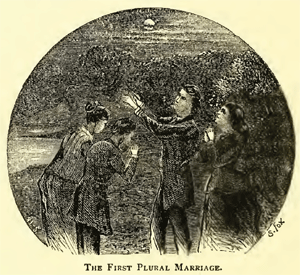
THE FIRST PLURAL MARRIAGE
He then advised Noble to seek a second wife for himself, and to commence at once to "build up his kingdom." He was not slow in following his Prophet's advice, and together the two men, with their chosen celestial brides, repaired one night to the banks of the Mississippi River, where Joseph sealed Noble to his first plural wife, and in return Noble performed the same office for the Prophet and his sister. These were the first plural marriages that ever took place in the Mormon Church, and they were obliged to be very secretly performed, and kept hidden afterwards.
The young girl that Mr. Noble married went to live with his first wife, and, as a matter of course, this arrangement produced the greatest misery to both. Outwardly they were compelled to keep a semblance of regard; but they hated each other with an intensity of hatred that cannot possibly be felt outside of polygamy. The first wife pined gradually away, until she was a mere shadow of her former self. Life for her was utterly wrecked. Compelled to share her home, her husband's affections, and his attentions with another woman, and to keep the strictest silence through it all, it is no wonder that the poor woman longed eagerly for death as a release from all her woes.
The condition of the second wife was, if possible, less enviable. A son having been born to her after her marriage to Noble, she was compelled to see herself pointed out as an object of pity, and her child branded as illegitimate. She was in a cruelly false position before the world, and she was powerless to justify herself; her lips were sealed, and she, too, must suffer in silence. Her parents were heart-broken at their daughter's shame. They were living in one of the eastern states, but they came instantly to Nauvoo to take their child home. She was compelled to turn a deaf ear to all their entreaties to return with them, and she could not tell them her secret. Her mother was nearly distracted when she was obliged to return home without her daughter, heart-broken and disconsolate, and bowed down with shame at her supposed dishonor. She remained at Nauvoo, and the burden of her life becoming greater than she could bear, became insane, -- a common fate of polygamous wives, by the way, -- and remained a maniac until her death. Her son, now a man grown, and living in Utah, was the first child born in polygamy. She was an innocent, engaging young girl, and a great favorite until this sad affair occurred; her sensitive spirit could not endure the torture of existence, and she died -- the first martyr to polygamy.
The first wife died soon after, literally broken-hearted. The husband has had many wives since then; indeed, he has been an indefatigable disciple of the Celestial Marriage system; but his many wives have died one by one, until he has been left alone. He is living still, and is pointed out and referred to with praise as the first man brave enough to respond to the call of Joseph Smith and become a polygamist.
One of the first persons to be initiated into the plural-wife doctrine, if not indeed Joseph's confederate in producing it, was Dr. John C. Bennett, at that time Mayor of the city, Major-General of the Nauvoo Legion, and a very great friend of Joseph. It is said that the pupil fairly outran the teacher, and his success as special pleader for the system of Celestial Marriage was so decided that he incurred the displeasure of the Prophet, and they quarreled violently. He taught the doctrine to some ladies whom Smith had intended to convert himself, and thus coming directly in contact with the Prophet and his schemes, a rupture was caused between the worthy co-workers.
Bennett apostatized, left Nauvoo, and wrote a book called "Mormonism Exposed," in which he fully ventilated the doctrine of spiritual wives which Joseph was about to introduce into the church, and accused the Prophet of the grossest immoralities. This expose created a wide-spread feeling of indignation, and, to save himself and his people, Joseph was obliged to deny all Bennett's statements; and several of the leading men and women denied them also, although they knew perfectly well that the greater portion of them was true. It is probable that the book would have had a much wider influence had not Bennett's character been so well known. He was a notorious profligate, and was pronounced by Gentiles who had known him before he embraced Mormonism to be "the greatest villain unhung."
Joseph's only method of defending himself from Bennett's attacks was to assail him in return. The raven was taunting the crow for being a blackamoor. He coupled Bennett's name with that of a lady of high standing in the Mormon community, in the most disgraceful manner, and published the scandal to a large congregation of the Saints, causing the utmost consternation and dismay. The lady in question had always been considered above reproach; never before had suspicion touched her name by even a breath, and the accusation which Joseph brought against her seemed too horrible to believe. But the Saints could more easily credit the scandal than they could believe for one instant that their Prophet could be guilty of misrepresentation; and the general conclusion was, that the lady had fallen from her virtuous estate, broken her marriage vows, and become a creature unworthy of countenance or sympathy.
Her husband was away from home when the trouble first commenced, but returning while the excitement was at its height, his indignation and rage at the position in which his wife was placed knew no bounds. He realized the situation at once, and saw that his wife was suffering from the Prophet's jealous anger, and was simply being used as a means of revenge and retaliation on his enemy Bennett. This has been the Mormon leaders' manner of doing things from the beginning; they believe most implicitly in vicarious suffering, and it is with them always the innocent and helpless who are punished for the wrong-doings of the more powerful.
The husband of this unfortunate lady came at once to the rescue of his injured wife's reputation. He "bearded the lion in his den," and defended his wife's character in public, hurling the lie at his leader's head, and incurring anathemas in return. He did not mind them, however, but still maintained his wife's honor in the face of everything. He was nearly insane with grief and rage, but he behaved nobly through the whole affair. He was greatly attached to the church, and could not make up his mind to forsake it, and he grieved over this action of his Prophet, but yet found an excuse for him on the ground that he had "lost the Spirit," and had been taken possession of by evil influences for a while. He loved his wife, and considered her terribly wronged and sinned against, and he tried by all the tenderness in his power to heal the cruel hurt which she had received. His own regard for and belief in her turned the tide of public opinion again in her favor, and she has been, if possible, more highly esteemed than ever since that unfortunate accusation. In course of time her husband, who is none other than Orson Pratt, one of the twelve apostles, took several plural wives, and became so warm in his advocacy of the system that he is called "the defender of polygamy." Mrs. Pratt has since apostatized, and is working nobly against Mormonism and its peculiar system. No woman is more highly regarded by Gentiles and Mormons than she. Her husband even, although she has steadfastly refused to live in polygamy with him, and has fought it from its first introduction, still has a high regard for her, although he looks upon her as lost beyond redemption. She is now an elderly woman, but her energy has not abated one whit, and she declares she will never relax her exertions towards putting down polygamy while she lives. If her husband is its "defender," she may be called its "denouncer;" and her work is the most certain of being crowned with ultimate success.
The days that preceded the Revelation were exciting ones in the church. Apostasy prevailed to an alarming extent, and the numbers of the faithful were sadly depleted, and many more threatened to leave the church, who were finally prevailed upon to remain. So intense was the feeling that in the summer of 1843 the Prophet, moved by pressure on every side, dissatisfaction within the church and hatred and indignation without, heightened by Bennett's expose and the corroborating accounts given by apostates, was compelled to intrench himself behind a divine "revelation" to shield himself from public odium and restore the wavering confidence of his people.
It had always been a practice of Joseph, whenever he met with any difficulty, to receive a "Revelation," which immediately put everything straight. On the present occasion he was equal to the emergency, and received that celebrated "Revelation" which then and since has constituted the sole authority in the Mormon Church for the practice of polygamy. It was at first only communicated to a chosen few, and it was not until long after polygamy had been practised more or less openly in Utah that Brigham Young delivered it to the world in 1852. It was then published in the "Seer" and also in the "Millennial Star" under the title of
CELESTIAL MARRIAGE.
A REVELATION ON THE PATRIARCHAL ORDER OF MATRIMONY, OR PLURALITY OF WIVES.
Given to Joseph Smith, the Seer, in Nauvoo, July 12th, 1843.
Of all the extraordinary "revelations" given by Joseph Smith during his eventful career, this is, perhaps, the most remarkable. It certainly produced a deeper and more lasting influence upon his deluded followers than all his other effusions put together, although its language is as ungrammatical as its tendency is immoral. The opening clause is peculiarly absurd. The Book of Mormon, the Book of Doctrine and Covenants, and countless "revelations" had denounced polygamy, and stated how offensive the conduct of some of the patriarchs in this respect had been to "the Lord." Yet here Joseph is made to ask that same "Lord" how he "justified" the very principle that Joseph had all along proclaimed that "the Lord" held to be "an abomination"! The Prophet's sons of course point to this fact, and say that it was impossible for their father to be guilty of such an unparalleled contradiction. The clause reads thus:
"Verily, thus saith the Lord, unto you, my servant Joseph, that, inasmuch as you have enquired of my hand to know and understand wherein I, the Lord, justified my servants as touching the principle and doctrine of their having many wives and concubines Behold, and lo, I am the Lord thy God, and will answer thee as touching this matter: Therefore, prepare thy heart to receive and obey the instructions which I am about to give unto you; for all those that have this law revealed unto them must obey the same; for, behold, I reveal unto you a new and everlasting covenant, and if ye abide not that covenant, then are ye damned; for no one can reject this covenant and be permitted to enter into my glory; for all who will have a blessing at my hands shall abide the law which was appointed for that blessing and the conditions thereof, as was instituted from before the foundations of the world; and as pertaining to the new and everlasting covenant, it was instituted for the fulness of my glory; and he that receiveth a fulness thereof must and shall abide the law, or he shall be damned, saith the Lord God."
Having made this very pleasant announcement, the Revelation goes on to declare that all contracts matrimonial or other were null and void unless ratified by the Prophet:
2d. "And verily I say unto you, that the conditions of this law are these: All covenants, contracts, bonds, obligations, oaths, vows, performances, connections, associations, or expectations, that are not made and entered into and sealed by the Holy Spirit of promise of him who is anointed both as well for time and for all eternity, and that, too, most holy, by revelation and commandment, through the medium of mine anointed, whom I have appointed on the earth to hold this power, -- and I have appointed unto my servant Joseph to hold this power in the last days, and there is never but one on the earth at a time on whom this power and the keys of the priesthood are conferred, -- are of no efficacy, virtue or force in and after the resurrection from the dead; for all contracts that are not made unto this end have an end when men are dead."
The third clause is simply a reiteration of the sentiments contained in the preceding; but the fourth announces one of the most peculiar tenets of Mormon theology. The reader will see that in it the assertion is distinctly made that if a man and woman are married by civil contract or according to the usage of any of the ordinary sects, although they may be among the most faithful members of the Mormon Church in every other respect, yet, after death, they shall not enjoy exaltation in heaven, they shall not become gods, shall not marry or have children, shall have no kingdom or priesthood, but shall simply be as the angels, servants and messengers of the Saints. It reads thus: --
4th. "Therefore, if a man marry him a wife in the world, and he marry her not by me nor by my word, and he covenant with her so long as he is in the world, and she with him, their covenant and marriage is not of force when they are dead, and when they are out of the world; therefore they are not bound by any law when they are out of the world; therefore, when they are out of the world they neither marry nor are given in marriage, but are appointed angels in heaven, which angels are ministering servants to minister for those who are worthy of a far more, and an exceeding and an eternal weight of glory; for these angels did not abide my law, therefore they cannot be enlarged, but remain separately and singly, without exaltation, in their saved condition, to all eternity, and from henceforth are not gods, but are angels of God for ever and ever."
Thus far the Revelation sets forth the uncomfortable fate of those who do not strictly conform to the teachings of the Prophet in matrimonial affairs. We now come to the other side of the question: the rewards which are to crown the faithful. The reader will observe that the strictest obedience is required to be paid to "him who is anointed," and who carries the keys.
6th. "And again, verily I say unto you, if a man marry a wife by my word, which is my law, and by the new and everlasting-covenant, and it is sealed unto them by the Holy Spirit of promise by him who is anointed, unto whom I have appointed this power and the keys of this priesthood, and it shall be said unto them, Ye shall come forth in the first resurrection, and if it be after the first resurrection, in the next resurrection; and shall inherit thrones, kingdoms, principalities and powers, dominions, all heights and depths, then shall it be written in the Lamb's Book of Life, that he shall commit no murder whereby to shed innocent blood. And if ye abide in my covenant, and commit no murder whereby to shed innocent blood, it shall be done unto them in all things whatsoever my servant hath put upon them, in time and through all eternity, and shall be of full force when they are out of the world, and they shall pass by the angels and the gods which are set there, to their exaltation and glory in all things, as hath been sealed upon their heads, which glory shall be a fulness and a continuation of the seeds for ever and ever.
7th. "Then shall they be gods, because they have no end; therefore shall they be from everlasting to everlasting, because they continue; then shall they be above all, because all things are subject unto them; then shall they be gods, because they have all power, and the angels are subject unto them."
This is the reward of the faithful. The Revelation, however, was intended to be comprehensive and final; it was to meet every case, and there was to be no appeal from its decisions. The married couple being united in strict accordance with the Revelation, they are now assured of salvation and exaltation in the world to come, provided they commit no unpardonable sin. In the following paragraph that sin is defined, but the reader must bear in mind that the blood of Gentiles is not "innocent" blood; the shedding of it, therefore, is no crime:
9th. "Verily, verily I say unto you, if a man marry a wife according to my word, and they are sealed by the Holy Spirit of promise according to mine appointment, and he or she shall commit any sin or transgression of the new and everlasting covenant whatever, and all manner of blasphemies, and if they commit no murder wherein they shed innocent blood, -- yet they shall come forth in the first resurrection, and enter into their exaltation, but they shall be destroyed in the flesh, and shall be delivered unto the buffetings of Satan unto the day of redemption, saith the Lord God.
10th. "The blasphemy against the Holy Ghost, which shall not be forgiven in the world nor out of the world, is in that ye commit murder, wherein ye shed innocent blood and assent unto my death after ye have received my new and everlasting covenant, saith the Lord God; and he that abideth not this law can in no wise enter into my glory, but shall be damned, saith the Lord."
In the italicized words, "but they shall be destroyed in the flesh," is foreshadowed that terrible doctrine the Blood-Atonement; of which I shall presently speak more. It was not long before the Saints were taught openly that it was their duty to "destroy in the flesh" all upon whom the leaders of the church frowned.
We come now to the examples which were held up for the Saints to follow: --
12th. "Abraham received promises concerning his seed and of the fruit of his loins, -- from whose loins ye are, namely, my servant Joseph, -- which were to continue so long as they were in the world; and as touching Abraham and his seed, out of the world they should continue; both in the world and out of the world should they continue as innumerable as the stars, or if ye were to count the sand upon the sea-shore ye could not number them. This promise is yours also, because ye are of Abraham, and the promise was made unto Abraham; and by this law are the continuation of the works of my Father, wherein He glorifieth himself. Go ye, therefore, and do the works of Abraham; enter ye into my law, and ye shall be saved. But if ye enter not into my law ye cannot receive the promises of my Father which he made unto Abraham.
13th. "God commanded Abraham, and Sarah gave Hagar to Abraham to wife. And why did she do it? Because this was the law, and from Hagar sprang many people. This, therefore, was fulfilling, among other things, the promises. Was Abraham, therefore, under condemnation? Verily, I say unto you, Nay; for I, the Lord, commanded it. Abraham was commanded to offer his son Isaac; nevertheless it was written, Thou shalt not kill. Abraham, however, did not refuse, and it was accounted unto him for righteousness.
14th. "Abraham received concubines, and they bare him children, and it was accounted unto him for righteousness, because they were given unto him and he abode in my law. As Isaac also and Jacob did none other things than that which they were commanded, and because they did none other things than that which they were commanded, they have entered into their exaltation, according to the promises, and sit upon thrones; and are not angels, but Gods. David also received many wives and concubines, as also Solomon, and Moses my servant; as also many others of my servants, from the beginning of creation until this time; and in nothing did they sin, save in those things which they received not of me.
15th. "David's wives and concubines were given unto him of me, by the hand of Nathan my servant, and others of the prophets, who had the keys of this power; and in none of these things did he sin against me, save in the case of Uriah and his wife; and therefore he hath fallen from his exaltation, and received his portion; and he shall not inherit them out of the world; for I gave them unto another, saith the Lord."
The audacity of Joseph Smith in stating as a Revelation from God, that "David's wives and concubines were given him of me by the hand of Nathan . . . in none of these things did he sin against me," is scarcely conceivable, when it is remembered that in the "divinely inspired" Book of Mormon it is written, "David and Solomon truly had many wives and concubines, which thing was abominable before me, saith the Lord." "The Lord," however, whom Joseph served, seems to have been as inconsistent in this as in many other matters. But in case of difficulty, Joseph was specially commissioned "to restore all things." Celestial Marriage was more exactly defined; and that the whole concern should run more smoothly, the keys of the kingdom on earth and in heaven were handed over to the Prophet.
16th. "I am the Lord thy God, and I gave unto thee my servant Joseph, an appointment, and restore all things; ask what ye will, and it shall be given unto you, according to my word; and as ye have asked concerning adultery, verily, verily I say unto you, if a man receiveth a wife in the new and everlasting covenant, and if she be with another man, and I have not appointed unto her by the holy anointing, she hath committed adultery, and shall be destroyed. If she be not in the new and everlasting covenant, and she be with another man, she has committed adultery; and if her husband be with another woman, and he was under a vow, he hath broken his vow, and hath committed adultery; and if she hath not committed adultery, but is innocent, and hath not broken her vow, and she knoweth it, and I reveal it unto you, my servant Joseph, then shall you have power, by the power of my Holy Priesthood, to take her, and give her unto him that hath not committed adultery, but hath been faithful, for he shall be made ruler over many; for I have conferred upon you the keys and power of the priesthood, wherein I restore all things, and make known unto you all things in due time.
17th. "And verily, verily I say unto you, that whatsoever you seal on earth, shall be sealed in heaven; and whatsoever you bind on earth, in my name, and by my word, saith the Lord, it shall be eternally bound in the heavens; and whosesoever sins you remit on earth shall be remitted eternally in the heavens; and whosesoever sins you retain on earth shall be retained in heaven.
18th. "And again verily I say, whomsoever you bless I will bless; and whomsoever you curse I will curse, saith the Lord; for I, the Lord, am thy God."
After all this preamble, -- the keys committed to Joseph, the relation of husbands and wives under the new dispensation defined, "Celestial Marriage" instituted, and a great many other matters discussed, we come to what was, no doubt, prominent in the Prophet's mind all the while he was dictating the Revelation to Elder Clayton, -- namely, how to manage "the Elect Lady," Mrs. Emma Smith. Accordingly she is made the subject of a special address. She is told to "receive all that have been given to my servant Joseph." She is forbidden to leave the Prophet, as she had threatened to do if he carried out his "celestial" system, and certain other very useful hints are given for her guidance if she would remain in peace. One particular passage is said to refer to a matrimonial scene in which a threat was held out that the life of the Elect Lady should be terminated by poison. She is here commanded to "stay herself, and partake not" of that which Joseph had offered her. It is, however, only right to add that the Mormon exponents of the Revelation say that this passage refers to an offer which Joseph had made to sacrifice his own personal feelings, and to accede to a divorce between Emma and himself. In these few lines more is disclosed of the Prophet's domestic life and difficulties than he probably was aware of. I give these paragraphs in full, that the reader may judge for himself.
20th. "Verily I say unto you, a commandment I give unto mine handmaid Emma Smith, your wife, whom I have given unto you, that she stay herself, and partake not of that which I commanded you to offer unto her; for I did it, saith the Lord, to prove you all, as I did Abraham; and that I might require an offering at your hand, by covenant and sacrifice; and let mine handmaid Emma Smith receive all those that have been given unto my servant Joseph, and who are virtuous and pure before me; and those who are not pure, and have said they were pure, shall be destroyed, saith the Lord God; for I am the Lord thy God, and ye shall obey my voice; and I give unto my servant Joseph, that he shall be made ruler over many things, for he hath been faithful over a few things, and from henceforth I will strengthen him.
21st. "And I command mine handmaid Emma Smith to abide and cleave unto my servant Joseph, and to none else. But if she will not abide this commandment, she shall be destroyed, saith the Lord; for I am the Lord thy God, and will destroy her if she abide not in my law; but if she will not abide this commandment, then shall my servant Joseph do all things for her, even as he has said; and I will bless him and multiply him, and give unto him an hundred fold in this world, of fathers and mothers, brothers and sisters, houses and lands, wives and children, and crowns of eternal lives in the eternal worlds. And again, verily I say let mine handmaid forgive my servant Joseph his trespasses, and then shall she be forgiven her trespasses, wherein she has trespassed against me; and I, the Lord thy God, will bless her, and multiply her, and make her heart to rejoice."
The concluding clauses speak for themselves. The reader will see that in the twenty-third the Prophet is completely set free from all responsibility, and left at liberty, without let or hinderance, to follow the dictates of his own sweet will. In the two concluding paragraphs the wildest licentiousness is permitted, in the name of "the Lord," to the masculine portion of humanity, -- if believers in Joseph, -- and the weaker sex are sternly warned of the penalties of doubt and disobedience.
23d. "Now as touching the law of the priesthood, there are many things pertaining thereunto. Verily, if a man be called of my Father, as was Aaron, by mine own voice, and by the voice of him that sent me, and I have endowed him with the keys of the power of this priesthood, if he do anything in my name, and according to my law, and by my word, he will not commit sin, and I will justify him. Let no one, therefore, set on my servant Joseph; for I will justify him; for he shall do the sacrifice which I require at his hands, for his transgressions, saith the Lord your God.
24th. "And again, as pertaining to the law of the priesthood: If any man espouse a virgin, and desire to espouse another, and the first give her consent; and if he espouse the second, and they are virgins, and have vowed to no other man, then is he justified; he cannot commit adultery, for they are given unto him. For he cannot commit adultery with that which belongeth unto him, and to none else; and if he have ten virgins given unto him by this law, he cannot commit adultery, for they belong to him; and they are given unto him therefore is he justified. But if one or either of the ten virgins, after she is espoused, shall be with another man, she has committed adultery, and shall be destroyed; for they are given unto him to multiply and replenish the earth, according to my commandment, and to fulfil the promise which was given by my Father before the foundation of the world; and for their exaltation in the eternal worlds, that they may bear the souls of men; for herein is the work of my Father continued, that He may be glorified.
25th. "And again, verily, verily I say unto you, if any man have a wife who holds the keys of this power, and he teaches unto her the law of my priesthood, as pertaining to these things; then shall she believe, and administer unto him, or she shall be destroyed, saith the Lord your God, for I will destroy her; for I will magnify my name upon all those who receive and abide in my law. Therefore it shall be lawful in me, if she receive not this law, for him to receive all things whatsoever I the Lord his God will give unto him, because she did not believe, and administer unto him, according to my word; and she then becomes the transgressor, and he is exempt from the law of Sarah, who administered unto Abraham according to the law, when I commanded Abraham to take Hagar to wife. And now, as pertaining to this law; verily, verily I say unto you, I will reveal more unto you hereafter; therefore let this suffice for the present. Behold, I am Alpha and Omega. Amen."
When Joseph released all other wives from their marriage contracts, of course Emma was also released. It is said she thought of making another choice, and would have done so, but the Revelation came in time to prevent it. Joseph offered to make the sacrifice, but the Lord told Emma to "abide and cleave to my servant Joseph," who had been cunning enough to insert these clauses in his "Revelation," so as to hold her more closely. It is said that she was shown the first copy of it, and burned it; if so, there must have been another in existence, for the one that Brigham Young gave in 1852 as Joseph's revelation was identical with that given a few of the chosen Saints in 1843.
I have entered somewhat more into detail regarding the early history of Mormonism than I intended in the beginning; but I have considered it necessary to do so, in order to show to my readers more fully the doctrines I have been taught from my infancy, and to give them some idea of the Mormon stand-point. They can easily see how things may become distorted when looked at from such a one-sided position.

